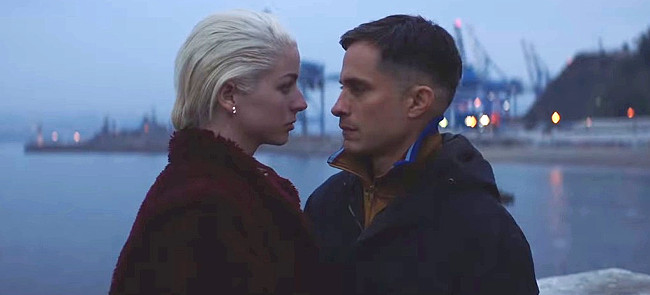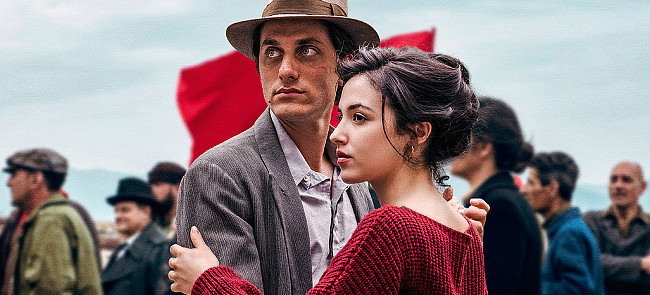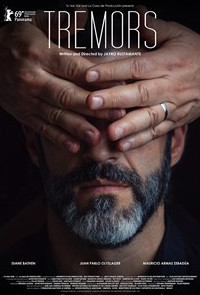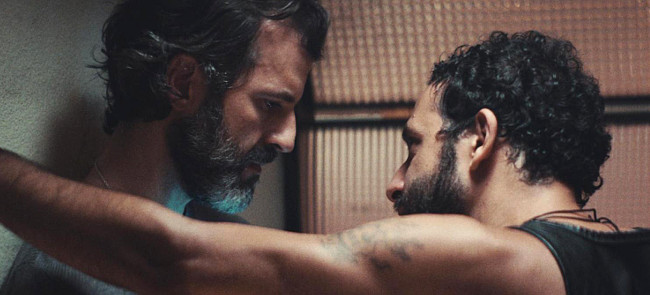| SHADOWS ON THE WALL | REVIEWS | NEWS | FESTIVAL | AWARDS | Q&A | ABOUT | TALKBACK | |||||
 Shadows off the beaten path Shadows off the beaten pathIndies, foreigns, docs, revivals and shorts...
On this page:
EMA |
MARTIN EDEN |
TREMORS
| |||||
| See also: SHADOWS FILM FESTIVAL | Last update 16.Oct.19 | |||||
|
Ema Review by Rich Cline | 
| |||||
 dir Pablo Larrain prd Juan de Dios Larrain scr Guillermo Calderon, Alejandro Moreno with Mariana Di Girolamo, Gael Garcia Bernal, Santiago Cabrera, Mariana Loyola, Josefina Fiebelkorn, Giannina Fruttero, Paola Giannini, Antonia Giesen, Susana Hidalgo, Paula Hofmann, Paula Luchsinger, Catalina Saavedra release Chl 26.Sep.19, UK Oct.19 lff, US Oct.19 mvff 19/Chile 1h42 VENICE FILM FEST TORONTO FILM FEST  |
 Deliberately messy, Pablo Larrain's Chilean drama challenges the audience to both take sides and admit that there may not be any sides to take. It's a riveting cinematic journey, packed with moments that are darkly chilling as well as sweetly moving. And even as it follows characters who largely behave like villains, the movie encourages the viewer to identify and sympathise with them, perhaps against our instincts. Not many films can make us think or feel this deeply. In Valparaiso, Ema (Di Girolamo) and her husband Gaston (Bernal) are struggling with the fact that they gave their adopted 7-year-old son back to social services following a couple of harrowing events. Ema is the lead dancer in Gaston's company, but she's becoming more interested in street dance with her two sisters (Sofia and Paula). She's also taking steps to get her son back by seducing both of his new parents, lawyer Raquel (Loyola) and firefighter Anibal (Cabrera). And she's developing an unhealthy interest in napalm. The story unfolds in a fragmented way, leaving key details to discover later while making relationships increasingly complex. Ema is basically a sociopath, so her desire for her child feels more selfish than maternal, especially as she's unconcerned who she hurts in the process, including him. Certainly her relationship with Gaston is toxic. But there are other things going on here, including subtle connections, earthy honesty and the fact that Ema is perhaps deeply in love with everyone she seduces. Di Girolamo has such a beautifully innocent face that it's easy to see why everyone is taken with her. She may be trying to burn everything down, but there's something naive about the way she faces life straight-on. Her scenes with Bernal snap in unexpected directions, as both actors create sharply defined individuals. And the same can be said for Loyola and Cabrera, who remain distinctive even as they fall under Ema's spell. But then each actor is vividly singular, entwined people who are defiantly independent. Even as it plays with issues of mental instability and dangerous pathology, the film is a clever exploration of human desires and connections. Larrain is always adept at exploring the space between his characters, and that's the main thing that defines this unstructured story. So even as it begins to feel like a freaky track into the darker corners of the human psyche, this is actually a film about the expansiveness of love.
| ||||
|
Martin Eden Review by Rich Cline | 
| |||||
 dir Pietro Marcello scr Maurizio Braucci, Pietro Marcello prd Beppe Caschetto, Viola Fugen, Pietro Marcello, Thomas Ordonneau, Michael Weber with Luca Marinelli, Jessica Cressy, Vincenzo Nemolato, Marco Leonardi, Denise Sardisco, Carmen Pommella, Carlo Cecchi, Autilia Ranieri, Elisabetta Valgoi, Pietro Ragusa, Savino Paparella, Vincenza Modica release It 4.Sep.19, UK Oct.19 lff, S Oct.19 nyff 19/Italy Rai 2h09 VENICE FILM FEST TORONTO FILM FEST  |
 Taking an ambitious approach to adapting the Jack London novel, this Italian drama is an artful odyssey packed with political and artistic themes. Eerily timeless, the film references Italian movie classics as director Pietro Marcello playfully stirs in eclectic music and archival footage cutaways. As it encompasses the entire 20th century, there's also a strikingly 21st century finale that makes the story almost unnervingly current. Swarthy seaman Martin (Marinelli) enjoys being a hit with the ladies until a random event lands him in the posh Naples mansion of the Orsini family, and he's smitten by their blue-eyed daughter Elena (Cressy). So the uneducated Martin becomes a rabid reader, expanding his vocabulary and developing his distinct political ideas, which are encouraged when he meets anarchic writer Briss (Cecchi). But he's still too rough for Elena's family, and it seems unlikely that he will ever become wealthy enough to support her lifestyle. But of course cultural currents have a tendency to shift. Martin bounces from one adventure to the next focussed on winning Elena and on becoming a published writer. And when his earthy style of storytelling becomes popular, his stardom changes everything. The narrative follows Martin's journey as he finds help from some people and is discouraged by others. These include his sympathetic sister Guilia (Ranieri) and her angry husband (Leonardi), the generous widow Maria (Pommella), his loyal friend Nino (Nemolato) and new long-suffering girlfriend Margherita (Sardisco). Marinelli manages to bridge each of Martin's phases beautifully, maintaining his innate charisma as a man who wins over everyone he meets, including those who disagree with him. Layered under that is the sense of a voracious learner who loves to have his ideas challenged and refuses to go with the flow. Each person in his life is played with passion by a solid ensemble cast, bringing out the internal aspects of characters who are strongly individualistic while also feeding into Martin's journey. Essentially experimental, Marcello assembles this movie as a collage of imagery and topical themes that are cleverly hooked into a driving central narrative. It's exploring the misuse of words like liberalism and socialism to distract people from the same old exploitative politicians, which basically just obscures the fact that slavery is alive and well today. But even with the tricky filmmaking, this is a remarkably involving story of a man working out who he is.
| ||||
|
Tremors Temblores Review by Rich Cline | 
| |||||
 dir-scr Jayro Bustamante prd Edgard Tenembaum, Pilar Peredo with Juan Pablo Olyslager, Diane Bathen, Mauricio Armas Zebadua, Rui Frati, Sabrina De La Hoz, Maria Telon, Magnolia Morales, Sergio Luna, Pablo Arenales, Mara Martinez, Joaquin Illescas, Pedro Javier Silva Lira release UK Oct.19 lff, US 29.Nov.19 19/Guatemala 1h47  |
 Complex and very tough, this Guatemalan drama dives into an issue that is hugely contentious in this strongly religious culture, as a family refuses to accept homosexuality as anything other than a sin. Writer-director Jayro Bustamante presents this in a strikingly straightforward way that's deeply unnerving, subtly revealing the hurtful hypocrisy and bigotry lurks under the surface of well-meaning people. When Pablo (Olyslager) is caught with Francisco (Zebadua), his family implodes just as another earthquake hits the city. His parents and siblings circle around him, his wife Isa (Bathen) and their two kids. The message is clear: his happiness is irrelevant, he needs to stop bringing shame on the family. Their church pastors (De La Hoz and Frati) step in to help him change, offering prayer and more intense cures. And when they forbid him from seeing his kids, Pablo begins to doubt the safety and natural affection he feels when he's with Francisco. Bustamante carefully highlights the irony of religious zealots preaching the importance of love while practising shame, fear and hatred. Caught in the middle, Pablo is a family man who simply wants to live honestly. But this is not allowed in a harshly legalistic society that has chosen what God says. The film cleverly contrasts Pablo's two lives: his wealthy, ordered family and sleek financial office against the loose energy of a local bar and the chaos of Francisco's cluttered flat. Performances also catch this distinction, as Zebadua's Francisco is almost too relaxed, even in sharply pointed encounters with Pablo's wife, mother (Morales) and the family maid (Telon). Remarkably, Olyslager is able to place Pablo in between these two worlds, subtly revealing the push and pull between them, relishing the ease of authentic living while craving the security of his family. This tension is vivid in each scene, which makes it impossible to know where he will end up. It's clear who he is, but what he will do is another question. As the story progresses, scenes deliver powerful kicks. From the torrential rainstorm in the opening segment to the jaw-dropping sequence in which the pastors enact their "cure" on a group of gay men. Through all of this Bustamante maintains an eerily realistic tone. The family's emotional reactions may seem over-the-top, but they are clearly expressed that way for manipulative effect. And with subtle undercurrents running through each scene, it isn't difficult to see the real motivations behind these despicable actions.
| ||||

See also: SHADOWS FILM FESTIVAL © 2019 by Rich Cline, Shadows
on the Wall
HOME | REVIEWS | NEWS | FESTIVAL | AWARDS
| Q&A | ABOUT | TALKBACK | | ||||

